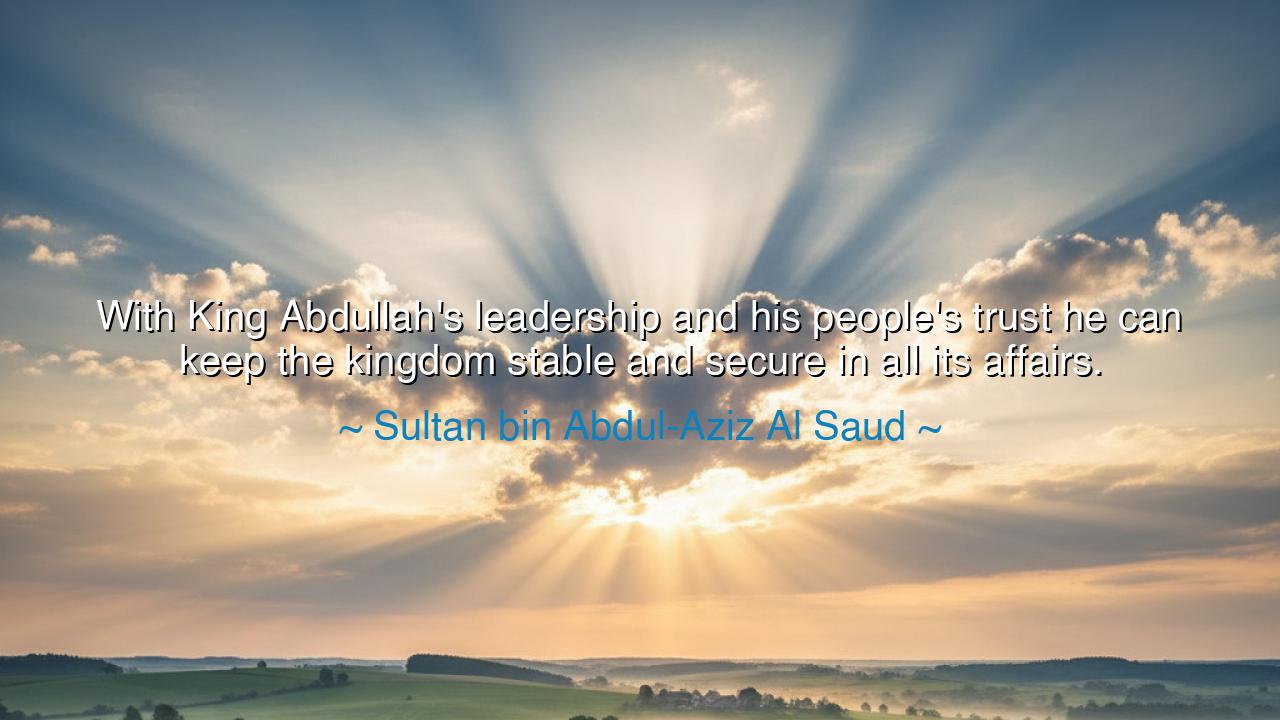
With King Abdullah's leadership and his people's trust he can
With King Abdullah's leadership and his people's trust he can keep the kingdom stable and secure in all its affairs.






The words of Sultan bin Abdul-Aziz Al Saud—“With King Abdullah's leadership and his people's trust he can keep the kingdom stable and secure in all its affairs.”—speak with the gravity of one who understood that the survival of nations rests upon the bond between ruler and people. In these words are bound two eternal pillars of governance: leadership and trust. Without one, the other falters; together, they form the shield that guards a nation from chaos. Sultan bin Abdul-Aziz looked to King Abdullah not only as a monarch, but as a shepherd of his people, entrusted with both power and responsibility.
To speak of leadership is to speak of vision, courage, and the wisdom to act for the greater good, even when the path is perilous. King Abdullah of Saudi Arabia, remembered as a reformer within tradition, sought to guide his people through storms of change in the modern era. He expanded education, opened opportunities for women, and strove for balance in a region often torn by strife. Leadership of this kind is not domination—it is stewardship, a careful tending of the flame so it neither dies out nor consumes.
Yet leadership alone is not enough. As Sultan bin Abdul-Aziz declares, it must be joined with the people’s trust. For no throne, no army, no treasure can secure a kingdom if its people’s hearts are turned away. Trust is the unseen armor of rulers, stronger than steel. It is won not through fear but through fairness, not through tyranny but through the assurance that the ruler’s heart beats for his nation. King Abdullah’s bond with his people gave him the strength to enact reforms without tearing apart the delicate fabric of tradition.
History is rich with examples of this principle. Consider Marcus Aurelius, the Roman emperor-philosopher. His armies defended the empire’s frontiers, but it was his character, his fairness, and his writings that bound the Roman people to him. They trusted him, for he did not live in excess nor rule with cruelty. Contrast this with Nero, who squandered trust through vanity and violence, and whose empire crumbled beneath rebellion. Trust is the crown jewel of leadership; once lost, no power can easily reclaim it.
Sultan bin Abdul-Aziz’s words also remind us that stability and security are not accidents, but the fruit of harmony between leader and people. In times of unrest, the ruler who listens, adapts, and serves will find his people standing with him. But the ruler who ignores their cries will find himself alone, besieged not from without but from within. The kingdom, in this sense, becomes a mirror: it reflects the quality of its leadership and the depth of its people’s trust.
The lesson for us all is clear. Whether in nations, in families, in workplaces, or in communities, stability is born from the same union: leadership joined with trust. If you are called to lead, do so with integrity and humility, for only then will others place their faith in you. If you are among the people, grant your trust wisely, to those whose words and deeds align, and hold them accountable with courage. For both ruler and people share responsibility for the strength of the whole.
So, O listener, take these words as a guiding flame. Let your leadership, however small or great, be rooted in service, not pride. Let your trust be given not blindly, but with discernment. And remember always that a nation—or any community—is strongest when its leader and its people are bound together in loyalty and respect. Then, and only then, can the house stand firm, the kingdom remain secure, and the future be entrusted to the generations yet to come.






AAdministratorAdministrator
Welcome, honored guests. Please leave a comment, we will respond soon